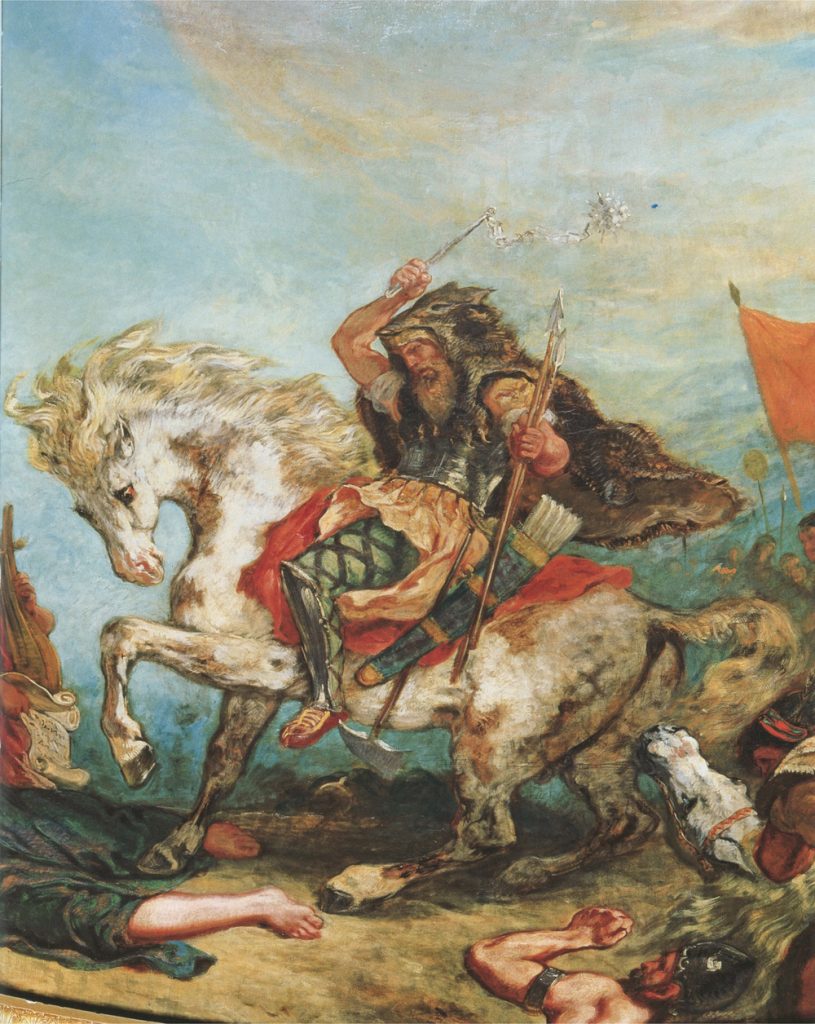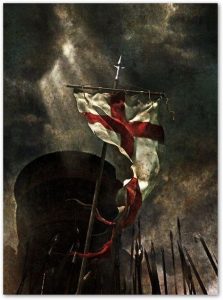There aren’t many people whose actions and life have brought astounding renown. In the case of those who have, their name, work, and stories have withstood the test of time. A lot of these people you may have heard of at some point in time, for example, Julius Caesar, one of Rome’s famous leaders. Of the many leaders and conquerors of history, there is one known as the “Scourge of God,” known for his ruthlessness, savagery, and barbaric acts, as he would overrun those who opposed him. And no, it is not Genghis Khan. Although they are somewhat similar, the “Scourge of God” came long before the famous Mongolian. The “Scourge of God” was the man Attila, leader of the Huns.
Born around 406 C.E. in Pannonia, in modern Hungary, Attila was the nephew of Rugila, King of the Huns. When Rugila died, around 435 C.E., Attila and his brother Bleda were appointed joint rulers.1 However, ten years later, Attila killed Bleda.2 No one knows exactly how or why Attila killed his brother, but many say it was on a hunting trip when an argument between the two might have escalated, and Attila, tired of sharing the throne, slew his brother. Attila was then in sole command of the Huns, and at this point he began his rampage across central Asia and into the Roman Empire, seeking to build his own empire.

The Romans were particularly concerned about the Huns, and rightly so, as the Huns were skilled warriors, primarily consisting of cavalry. After Attila’s uncle died and he took the mantle, he knew that he had to end the usage of the Hunnish people by the Romans. As a result of negotiating, the Romans had conceded to Hun demands and paid a tribute to the Huns! Attila expanded his empire at the expense of the Romans, raiding and plundering their cities as if he were some sort of pirate. He was known as the “Scourge of God” for his ferocious and cunning nature.3 But what exactly did they mean by the “Scourge of God?” The Romans thought that Attila’s invasions and attacks were an affliction or punishment from God, who was calling them to get right with Him. The Roman Empire had recently turned to Christianity, following the conversion of Emperor Constantine in the previous century. In the wake of Rome’s sack by the Visigoths in 410, Christian Rome was awash in apocalyptic interpretations of its plight. It is said that the Romans believed Attila to be one of the four horsemen of the apocalypse. The four horsemen are said to represent Conquest, Famine, Death, and War. At the time of Attila’s raids and expansion of his empire, the eastern Romans were also facing plagues and famines. Also during this period, the eastern Romans faced the effects of a fierce earthquake, which destroyed parts of their cities. The Roman people began to interpret these things as the beginning of the end as foretold in the Book of Revelations.4
Attila’s raids and the formation of the Hunnic Empire helped hasten the fall of the Roman Empire in its western half.5 You could imagine that the people of Rome became distressed at the fact that neither they nor their government could do anything to stop Attila. The scourge stomped his way into central Europe wreaking havoc and displaying his authority. Attila may have been seen as a warmonger to the people of Rome, but to his own people, he actually wasn’t so bad. He is said to have been a fair and generous leader with his people; he also didn’t impose taxes on them.6
The barbaric rage of Attila eventually slowed down when he invaded Gaul around 451 C.E. He was met by Roman general Flavius Aetius, who was aided by Visigoths under their king, Theodoric I. This led to Attila’s defeat in the great Battle of Chalons, from which he lost a great amount of men and was forced to retreat.7 Defeated, Attila and his forces had no other choice but to sit back and recover from the casualties from their last battle. Once they regained some of their strength, Attila decided to divert his focus to Italy, where he devastated some of its cities. When Attila came to Rome, it is noted that he had a meeting with Pope Leo (the Great), where the Pope was able to persuade him to spare them. Attila then led his armies out of Italy.8 It is thought that the “Scourge of God” supported the development of various stories about saints who protected their cities, in this case, somewhat boosting Pope Leo’s own favor.9
After his defeat at Chalons, and his sparing of Rome, Attila was no longer seen as intimidating as he once had been. He returned to the region of the lower Danube, where he apparently remarried. The “Scourge of God” was found dead in 453 C.E. in his bed after a party, where his newlywed wife also laid. There remains only speculations as to how Attila truly died, but he was mourned greatly by his people. Eventually, the confederation of tribes that Attila had brought together grew restless under the rule of Attila’s sons, and those tribes began to dispersed, ending the “Scourge” so dreaded by so many.10
- Salem Press Biographical Encyclopedia, January 2017, s.v. “Attila the Hun,” by John D. Windhausen. ↵
- Salem Press Biographical Encyclopedia, January 2017, s.v. “Attila the Hun,” by John D. Windhausen. ↵
- The Greenhaven Encyclopedia of Ancient Rome, 2002, s.v. “Attila” by Don Nardo. ↵
- Salem Press Biographical Encyclopedia, January 2017, s.v. “Attila the Hun,” by John D. Windhausen. ↵
- Salem Press Biographical Encyclopedia, January 2017, s.v. “Attila the Hun,” by John D. Windhausen. ↵
- Gale Encyclopedia of World History: Governments, 2008, s.v. “Hunnic Empire.” ↵
- Funk & Wagnalls New World Encyclopedia, 2016, s.v. “Atilla.” ↵
- The Greenhaven Encyclopedia of Ancient Rome, 2002, s.v. “Attila,” by Don Nardo. ↵
- Michael Whitby, “Attila the Hun, Barbarian Terror and the fall of the Roman Empire,” The Journal of Roman Studies, Vol. 100 (2010): 344. ↵
- Salem Press Biographical Encyclopedia, January 2017, s.v. “Attila the Hun,” by John D. Windhausen. ↵



32 comments
Annissa Noblejas
This great warrior was truly worthy of being the physical personification of Rome’s apocalyptic fears. Attila was unapparelled in his brutality of enemy forces. However, to his own people he seemed a just ruler for the times. I suspect that his decision to not enforce a tax was brought out of the abundance of wealth provided by Roman plunder. Violent men most often meet with violent ends. It is not surprising that he was found dead and the full circumstances were never uncovered.
Constancia Tijerina
I have heard about Attila the Hun and how great he must have seemed, but now that i have read this article i have come to the conclusion that he may just be feared by many due to the fact that he had this great army and how ruthless and merciless he was towards all his victims and battles he has had. I feel this article did not go into so much depth of who exactly is this man and why he did the things he had done and how this article got more side tracked on making the persona of who Attila was brought out to be in the perspective of his victims. Over all, this was a great read.
Auroara-Juhl Nikkels
I had briefly heard the name Attila before, but I could not place where. Your article was very well written and very informative. I find it very interesting how the people thought Attila was one of the four horse men sent at the time of the apocalypse. Reading your article, I could see why people that were not his own thought he was so fierce and vicious. That attitude really only seemed to come out when it was against people who were not his people.
Carlos Sandoval
Honestly this is probably one of my favorite articles because it kept me entertained. If I lived in those times, I think I would be scared of him too, they were ruthless. I always knew he was a person but never knew his whole story and what exactly he did but this article did a great job of giving the information.
Christopher King
Atilla the Hun weakened an already failing Roman Empire and the remarrying that was mentioned in the article was to a Roman woman used to get Atilla the Hun to leave Rome and move onto a different country. Also, one of the theories of how he died is that he drank himself to death when celebrating. Aside from this Atilla was devastating to the Roman Empire and did a lot of destruction among the Roman Empire’s army. I felt there was a bit of distraction of Atilla and his accomplishment midway through the article.
Samuel Ruiz
Great article! This was another in which reminded me of the story of Cain and Able, where on brother killed the other. It was an interesting read, especially the explanation of how the Romans had believed Attila was one of the four horsemen who were mentioned in the Book of Revelation. I also loved the use of “Him” when referring to God.
Hannah Wilson
I knew how vicious and battle driven Attila was, but I never realized he showed mercy to some people. I also did not know that his people actually respected and approved of him and the devastation he caused other countries and people. It is interesting that Pope Leo was able to talk him into sparing Italy. It makes the Romans belief that God was punishing people through the Huns a little more believable. Great article.
Timothy ODekirk
I always knew Atillia the Hun from the “Night at the Museum” movies. I also knew him from my previous western Civilization classes, but I was not familiar with him in this much detail. I always knew the Huns to be fearless warriors and to be one of the most feared enemies by Ancient Rome. I found it interesting how Attila was mysteriously killed after a party. He most likely was assassinated. Whatever happened to Attila, we may never know, but I still find it mysterious and interesting.
Erin Vento
This was a really cool article! I don’t think there is a lot of people who were able to cause so much destruction, but Attila is definitely up there with the few. Its nice that you showed how although he was a brutal warrior, he had a lighter side when it came to his people and how he took care of them.
Isaac Saenz
Attila’s legacy is one of destruction and violence. I cant imagine what it would be like for his tribe to raid and destroy my own town. A person like that continues to do what they do not for fame or fortune, but simply because they’re good at it. I believe that Attila enjoyed killing and sacking towns as a twisted form of recreation. It is surprising that he was influenced by the Pope to spare them, I wish I could listen in on the conversation that took place and find out how it really went down.